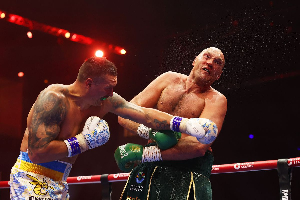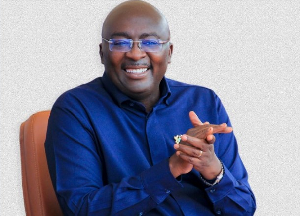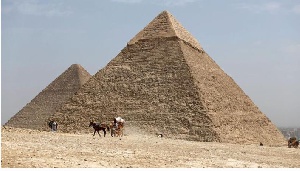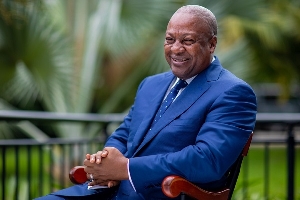- Home - News
- TWI News | TV
- Polls
- Year In Review
- News Archive
- Crime & Punishment
- Politics
- Regional
- Editorial
- Health
- Ghanaians Abroad
- Tabloid
- Africa
- Religion
- Election 2020
- Coronavirus
- News Videos | TV
- Photo Archives
- News Headlines
- Press Release
General News of Tuesday, 3 June 2003
Source: Chronicle
JAK promises $1000 per capita by 2013
THE PRESIDENT, John Agyekum Kufuor, has stated that his administration would do all it could to raise the per capita income of the country from$350 to $1000 within ten years.
The president said this last week when he gave the closing remarks at the Ghana Investors’ Advisory Council’s (GIAC) third meeting in Accra.
He was convinced that with the help and expertise of the GIAC members, the transformation of the country’s economy to that of $1000 per capita income would be possible in a few years. His Excellency assured the members of GIAC of his government’s fullest co-operation and support to attract more foreign investments into the country.
Earlier in his address to the council, the president gave a report on the progress made last year by his government in the implementation of recommendations of the GIAC made last year.
He said the most essential was law and order about which he revealed that crime rate has reduced by 18%. He noted that there has been an improvement in the security status of the country and he attributed this to the provision of equipment for the Police Service.
On land reforms, Mr. Kufuor said the government had identified all the several parcels of land that were acquired by the state, evaluated them and compensation paid where it had not been paid. He noted that those lands would be added to the Land Banks, which would be created very soon.
President Kufuor said with the establishment of the fast track high courts, commercial disputes are being dealt with more quickly. He said the alternative dispute resolution forum that aims at helping the resolution of disputes outside the formal court system, which was introduced by the government, is proving to be popular with the people.
On the establishment of offshore banking industry, he said progress was being made with the help of Morocco, Mauritius and Malaysia.
Touching on the clearing of goods at the country’s ports, he said the inspection and price verification regimes at the ports are being done by four different people instead of one.
He said some modest gains had been made in the quest to address the problem of accessing long-term funds by the establishment of a credit line of $40million, which had been secured from the HSBC Exim bank of USA to support Small and Medium Scale Enterprises (SMEs).
Salt and agro-processing got credit from the Ecowas Bank for Development and Investment in addition to $5million that was received from the government of Canada to support micro, small and medium enterprises.
The president said the period saw Telenor, a Norwegian Telecom Company, taking control of Ghana Telecom, the Indo-Ghana ICT project almost complete and placing the National Institutional Reform programme under the direction of the senior minister.
He expressed the government’s conviction that the macro-economic gains recorded have a better chance of being sustained after the cedi came under pressure because of the increases in the prices of petroleum products a few months ago.
May 9 also saw the Executive Board of the IMF$258million for the country in support of economic reform programme for 2003 to 2005 under the poverty reduction and growth programme.
He announced that a One-Stop-Shop concept would be operational at the Ghana Investment Promotion Centre (GIPC) very soon.
The president set up a three-man committee to supervise the implementation of the GIAC’s recommendations and to report directly to him.
The committee consists of Messrs Kwanena Bartels, the Minister for Private Sector Development, Ebenezer Assoka, Managing Director of Standard Chartered Bank and Prof. Kweku Appiah-Adu, Head of the Policy Co-ordination, Monitoring and Evaluation, Office of the President.
A communiqu? issued by the GIAC and read by the minister for private sector development called for accelerated structural reforms in five areas including agriculture and agro-business, customs and civil service reform, financial, labour and land reforms.
Later in an interview with the chief executive officer of Data Bank, Mr. Ken Ofori-Atta about offshore banking, he said the challenge of the country’s economy to grow at 9% per year is to fill the huge gap between savings and investments and that it was this basis that led the council to recommend offshore banking and modernization of the country’s financial system.
He said the country could be the regional financial services centre, if these measures are resolved. In another development, the Ghana Site Manager of Affiliated Computer Services (ACS), Mr. Jim Charles, announced the creation of a new technology centre in the country.
The 40,000square-foot new office complex would include 1,000 workstations, full satellite communication capabilities, a training centre, library, and a cyber caf? to provide workers online access to the internet and also to enhance their training and development.
He said, the workforce of the company is expected to reach 2000 by next year and the country would become ACS’ single largest location of workers in the sub-region. The manager stated that the company now employs 1300 workers.
ACS currently performs data processing services supporting numerous clients in the communications, healthcare, and insurance.
The manager later donated a cheque of $1,000 to the president for the construction of wells and bore hole for the folks in the rural areas.










